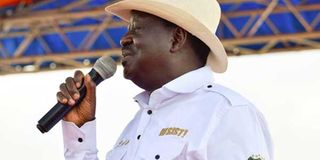Tough times ahead for nation as stage set for political tussle

Nasa leader Raila Odinga. The plan to swear him in as the “people’s president” comes with several challenges, and also an opportunity to placate his disaffected supporters. PHOTO | BRIAN ONGORO | AFP
What you need to know:
It appears the Kenyatta administration’s final term will be faced by protests and de-legitimisation by the opposition.
The recent initiatives by American and European Union diplomats to bring about dialogue are a measure long required but slow in the making.
This dialogue should ideally be coming from the government and opposition in Parliament.
The plan to swear in Nasa leader Raila Odinga today as the “people’s president” comes with several challenges, and also an opportunity to placate his disaffected supporters.
The National Super Alliance boycotted the repeat presidential election on October 26, on the basis that its outcome was predetermined in favour of President Uhuru Kenyatta.
Therefore, this opposition push is a sign of the tough times ahead for the country in a deadly game of political brinkmanship.
On the one hand, the swearing-in of Mr Odinga delegitimises the sitting administration and keeps the hopes of opposition supporters to have meaningful electoral, democratic and political reform on the front burner.
On the other hand, it risks further entrenching the hardliners in the Kenyatta administration, who feel that dialogue with the opposition would be a sign of weakness and could be used to galvanise its supporters over the next five years to the 2022 elections.
The status quo obfuscates deeper underlying challenges about a bankruptcy of leadership and the use of ethnicity as a tool for political mobilisation.
PROTESTS
It appears the Kenyatta administration’s final term will be faced by protests and de-legitimisation by the opposition.
What was a final showdown between the son of the first President, Mzee Jomo Kenyatta, and the son of the first Vice-President, Jaramogi Oginga Odinga, is turning ugly. Mr Raila Odinga feels he has been cheated out of victory all the four occasions he has run for office.
At least half of the country voted for him in the August 8 elections and feels the Kikuyu-Kalenjin alliance since independence is no longer tenable.
This has further polarised and poisoned an already toxic political environment.
ANCESTRAL
Take the case of Malindi (a Raila Odinga stronghold). Malindi is a coastal town, where the local communities feel locked out of their ancestral land by elites (including members of the Kenyatta and Moi families), who have allegedly used their access to political power to illegally acquire it. Many locals are squatters.
They are bitter that powerful figures in government have not addressed long-held grievances.
The government would wish to pretend that all is well and use the state machinery to intimidate and coerce compliance from opposition supporters.
For its part, the Odinga-led Nasa is desperate to undermine and delegitimise the government rather than play its part as a loyal opposition using constitutional means to keep it in check.
The opposition’s tactics, include boycotting its oversight role in Parliament through committees. It has committed itself to creating “People’s Assembles”, to act as shadow legislatures to the county governments in opposition strongholds.
The opposition has also committed itself to mass street demonstrations to force the government to dialogue. What this has amounted to is political brinkmanship, whereby the opposition elite use unemployed youth to engage in violence on the streets of major towns to gain international media attention and embarrass the government.
But the government tends to overreact to any political move or statement by the opposition. Clashes between youth and security during demonstrations has resulted in deaths.
DIALOGUE
The recent initiatives by American and European Union diplomats to bring about dialogue are a measure long required but slow in the making.
This dialogue should ideally be coming from the government and opposition in Parliament.
It is time the opposition and the government began to take ownership of the challenges facing the country rather than engage in brinkmanship.
Balkanising the country along ethnic lines will create a situation where the poorest Kenyans will suffer most.
It is time for dialogue.
Dr Monda teaches in the Department of Political Science, City University of New York - Guttman College. [email protected]




